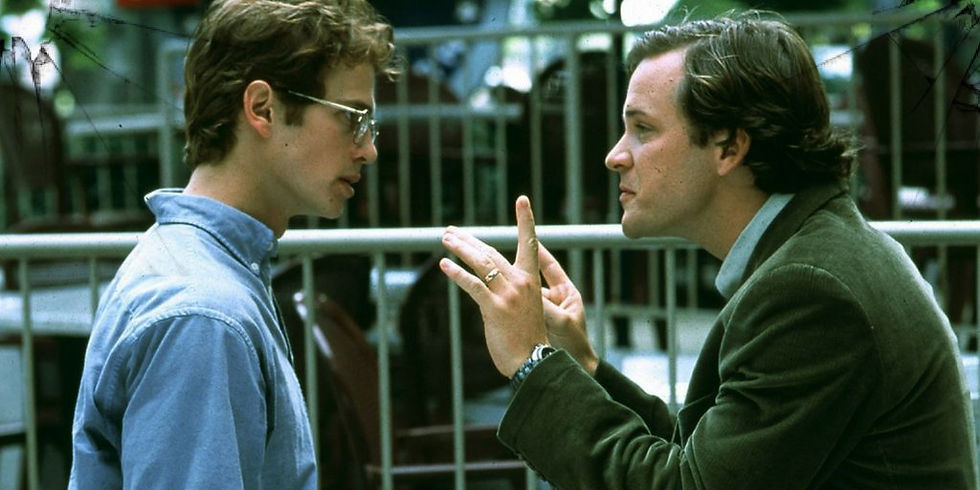Shattered Glass (2003)
- santiago_enrique
- Jul 18, 2019
- 3 min read
I would say that out of the three movies that was required of us to view and write a reflection about, Shattered Glass was the most entertaining and thrilling to watch. The flow of the movie makes us side with Steve, and how he is the victim of some suspicion by his editors. The movie shows us little details that we might miss, and then once the main problem was revealed, suddenly we are able to connect the dots. The beginning of the film showed Michael, who was the editor of the magazine at that time, asking Steve about some facts that seemed fabricated. Steve admits that he might have gotten some details incorrectly, and even offers to resign, but Mike does not give it much attention. Once the main conflict of the film was revealed, we know remember this scene, and find out that Steve has in fact been fabricating parts of his story.
The film’s main conflict is dishonesty in journalism. In the beginning of the film, when Mike confronts Steve about the minibar fact and that David Kean, who ran the conference, said there were no minibars in the hotel. Steve tells Mike that he “must have made a mistake,” and that he was willing to resign if needed. We are led to assume that Steve just honestly made a mistake.
Steve’s downfall was slowly revealed when he wrote a story titled Hack Heaven, detailing a story from his own perspective about Ian Restil, who hacked into Jukt Micronics and how the company supposedly had a meeting with him wherein he demanded certain things such as a Mazda Miata and a trip to Disneyland. In the Forbes internet magazine, Penenberg, who was responsible for all things tech, was asked by his editor why he was not able to get the news about Ian Restil. Penenberg began to fact check the story, as he was unaware of this event, and began to uncover details in Steve’s story that were not verifiable. This led to an investigation by their team. Penenberg, with the Forbes internet magazine, contact Chuck and ask him to verify with Steve certain details in the story such as people, phone numbers, and addresses. The Forbes internet magazine ask Chuck to set up a conference call where Steve, in a panicked state, tells them the contents of his notes which reveal more inconsistencies. Chuck is now suspicious of Steve and ask him to bring them to where the meeting with Ian Restil took place, and the Hacker’s Convention. Upon arriving to the building where the convention supposedly took place, the concierge tells Chuck that the building was closed on Sundays, the day of the convention. Chuck and Steve now go to the restaurant where they supposedly had dinner, but the sign states that the restaurant closes in the afternoon at 3pm. Steve, now under extreme pressure, argues with Chuck; repeating the line: “I’m not doing anything wrong.” This angers Chuck, and tells him that he needs to know if the story was indeed fabricated, and that the Forbes magazine could conduct a formal investigation to reveal Steve’s untrue facts. In the car ride back to the office, Steve reveals that he made up the story, basing it from his sources, to make the story more “colorful.” Chuck then fires Steve, which angers Caitlyn. Chuck angrily explains to Caitlyn that she would not have believed that Steve had only done it once if he was a stranger, and that she would dig further and investigate his previous stories. Chuck tells Caitlyn that the whole office would have to apologize, because they let Steve’s stories go unchecked all due to his charm, and entertaining personality.
The problem was only resolved when Chuck fired Steve.
The beginning of the movie would have the audience side with Steve, and label Chuck as an antagonist; who’s out to get Steve. However, as more of the plot is revealed, Steve’s character is morphed into that of an antagonist, and Chuck is the protagonist that removed that threat to the company. I would side with Chuck, if I was in that newsroom. Journalism is about telling people the facts, and that is the complete opposite of what Steve did. The scene where Steve, after being fired, comes back into the office and begs Chuck to take him to the airport while crying and Chuck simply tells him no and that what Steve was saying was a “nice story” really impacted me. This reveals to us that Chuck, even though he seemed cold, was able to see that Steve was merely trying to get to Chuck’s emotional side, hoping that he would change his mind. I would say that journalism is about facts, and emotions should not get in the way.
Enrique



Comments